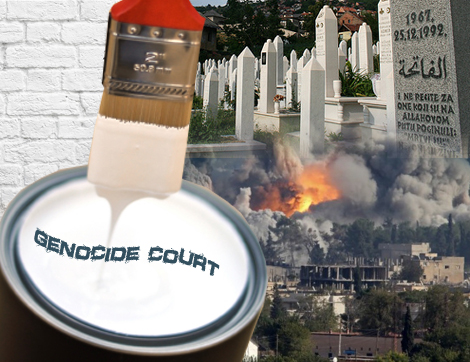
By Richard Walker —
A ruling by the United Nations’s International Court of Justice (ICJ) clearing Serbia and Croatia of genocide in the Balkan wars of the 1990s has shed light on a conflict in which the United States and the North Atlantic Treaty Organization (NATO) played a pivotal role. In fact, some people now say the U.S. and NATO should have been the ones appearing before the international judges for the illegal bombing of Serbia in 1999.
In 2007, the ICJ, which accepts cases between states and holds its hearings in The Hague, as does the International Criminal Court, found that Bosnian Serb forces were guilty of genocide in the slaughter of almost 8,000 Bosnian Muslims at Srebrenica in 1995. However, the court did not find Serbia guilty. The 1948 Genocide Convention is framed legally so genocide by a state, or its leaders, is difficult to prove. Ethnic cleansing that took place on all sides in the Balkans conflict did not meet the legal definition of genocide set forth in the Genocide Convention,which stipulates that genocide requires a deliberate plan to destroy a national, ethnic, racial or religious group.
Nevertheless, Washington and its NATO allies chose to attack Yugoslavia. The Clinton administration wanted a confederacy of states like Croatia, Bosnia and Kosovo to break away to erase the Yugoslav Republic and end the possibility of Serbia, its most powerful entity, emerging as a Greater Serbia.
In all the coverage since of genocide and charges of ethnic cleansing, the role played by the U.S. and NATO has been airbrushed out of the history of the period. For example, Washington encouraged the Central Intelligence Agency to secretly arm the Kosovo Liberation Army (KLA), bent on achieving independence from Serbia, which had been on a U.S. terror watch list. The KLA was mostly made up of ethnic Albanians, but later attracted Muslim fighters from the Middle East. The KLA thought nothing of killing Bosnian Serbs in order to force Serbia into over-reacting in order to have an international spotlight shone on Kosovo.
The U.S. and NATO began a bombing war against Serbia in March 1999 that lasted for 78 days and was the biggest attack on a European country since WWII. More than 14,000 bombs were dropped, including cluster bombs and missiles, carrying depleted uranium warheads.
The legality of the war launched by Bill Clinton was later challenged by lawyers representing Serbia, but the ICJ judges refused to hear the case. Nonetheless, there was substantial evidence from Human Rights Watch that NATO’s killing of Serbian civilians and the destruction of 300 schools and hospitals, as well as a passenger train and the Chinese Embassy in Belgrade, constituted war crimes.
Richard Walker is the pen name of a former N.Y. news producer.


… and the I.C.J.
The heck with the I.C.C.